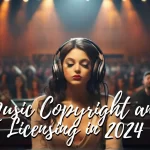Monetizing Your Music: Exploring Different Revenue Streams
For musicians and artists, creating captivating music is just one part of the journey. Finding ways to monetize that music effectively is essential for sustaining a career in the music industry. In today’s digital age, opportunities abound for musicians to generate revenue through various channels beyond traditional album sales and performances. In this comprehensive guide, we will explore different revenue streams available to musicians, ranging from digital platforms to live events and merchandise, empowering artists to maximize their earnings and reach wider audiences.
Monetize Your Music and Grow a Career
1. Digital Distribution Platforms
With the rise of streaming services and digital downloads, artists can distribute their music globally with ease. Platforms like Spotify, Apple Music, Amazon Music, and Deezer offer opportunities for artists to earn royalties based on streams and downloads. It’s crucial for artists to understand streaming royalty rates, playlist placement strategies, and audience engagement tactics to optimize earnings on these platforms.
2. YouTube and Content Monetization
YouTube is not only a platform for sharing music videos but also a powerful revenue-generating platform through ads, sponsorships, and content monetization. Artists can monetize their YouTube channels by joining the YouTube Partner Program, enabling ads on their videos, and leveraging affiliate marketing and sponsorships. Creating engaging video content, lyric videos, live performances, and behind-the-scenes footage can attract viewership and boost monetization opportunities.
3. Licensing and Sync Deals
Licensing music for films, TV shows, commercials, video games, and online content can be a lucrative revenue stream for artists. Collaborating with music licensing agencies, sync agents, and production companies can help artists secure placements and negotiate favorable licensing deals. Sync licensing not only provides upfront fees but also exposes artists to new audiences and enhances brand visibility.
4. Live Performances and Tours
Live performances remain a cornerstone of music monetization, offering artists direct interaction with fans and revenue from ticket sales, merchandise, and sponsorships. Artists can plan tours, concerts, festivals, and intimate gigs to showcase their music and engage audiences. Building a strong live performance reputation requires effective promotion, booking management, stage presence, and fan engagement strategies.
5. Merchandise Sales and E-commerce
Merchandise sales complement music revenue streams and strengthen fan connections. Artists can sell branded merchandise such as T-shirts, posters, vinyl records, CDs, accessories, and limited-edition items through their websites, online stores, concerts, and social media platforms. Innovative merchandising ideas, collaborations with designers, and personalized fan experiences can boost merchandise sales and brand loyalty.
6. Crowdfunding and Fan Support Platforms
Crowdfunding platforms like Kickstarter, Indiegogo, and Patreon empower artists to fund new projects, albums, music videos, and creative endeavors through direct fan support. Offering exclusive rewards, access to behind-the-scenes content, and personalized experiences incentivizes fans to contribute and become patrons of the arts. Building a loyal fan community through regular updates, interactions, and value-added content is key to crowdfunding success.
7. Music Publishing and Royalties
Registering music with performing rights organizations (PROs) such as ASCAP, BMI, SESAC, and SOCAN ensures that artists receive royalties for public performances, radio airplay, streaming, and international usage. Understanding music publishing, mechanical royalties, sync royalties, neighboring rights, and PRO distribution processes helps artists maximize their earnings from their musical compositions and performances.
8. Sponsorships, Endorsements, and Brand Partnerships
Collaborating with brands, sponsors, and endorsements can open new revenue streams for artists while expanding their audience reach. Partnering with clothing brands, instrument manufacturers, tech companies, lifestyle brands, and events can lead to sponsorships, product placements, endorsements, and promotional opportunities. Aligning with brands that resonate with the artist’s image and values is crucial for authentic partnerships.
9. Teaching, Workshops, and Online Courses
Sharing musical expertise through teaching, workshops, masterclasses, and online courses can generate supplemental income for artists. Offering private lessons, group workshops, music production tutorials, songwriting classes, and instrument courses appeals to aspiring musicians, students, and music enthusiasts. Online platforms like Udemy, Skillshare, and Teachable provide tools for artists to create and monetize educational content.
10. Collaborations, Remixes, and Features
Collaborating with other artists, producers, DJs, and remixers can lead to new revenue opportunities through joint releases, remix projects, and featured appearances. Exploring cross-genre collaborations, guest features on albums, remix contests, and compilation albums expands artistic horizons and attracts diverse audiences. Clear communication, fair compensation agreements, and creative synergy are vital for successful collaborations.
11. Music Production Services
Offering music production, recording, mixing, mastering, and session musician services can supplement artists’ income streams. Providing professional studio services to other musicians, bands, filmmakers, and content creators not only generates revenue but also expands networks and builds industry credibility. Developing a portfolio of high-quality productions, showcasing skills on social media and industry platforms, and cultivating positive client relationships are essential for success in music production services.
12. Digital Merchandising and NFTs
Exploring digital merchandising, non-fungible tokens (NFTs), and blockchain technology opens new avenues for monetization and fan engagement. Creating digital art, exclusive music releases, virtual collectibles, and interactive experiences can be sold as NFTs, offering scarcity, authenticity, and ownership rights to buyers. Partnering with NFT platforms, hosting auctions, and collaborating with digital artists and developers can unlock innovative revenue streams and creative expressions.
13. Music Licensing Libraries
Building a catalog of licensable music for royalty-free music libraries, sync agencies, production houses, and media platforms can generate passive income through licensing fees and royalties. Crafting music across diverse genres, moods, and themes tailored for commercial use expands opportunities for music placements in films, TV shows, advertisements, podcasts, games, and online content. Registering music with music libraries, maintaining metadata, and networking with music supervisors enhance visibility and licensing prospects.
14. Affiliate Marketing and Sponsorship Programs
Joining affiliate marketing programs, music gear sponsorships, and affiliate partnerships with music brands, online platforms, and music-related products/services can create additional revenue streams. Promoting affiliate links, discount codes, and sponsored content through social media, blogs, and newsletters to your fan base monetizes audience engagement while offering value through product recommendations and collaborations.
15. Intellectual Property Management
Managing intellectual property rights, copyright registrations, publishing agreements, and royalties collection ensures artists receive fair compensation for their creative works. Working with music publishers, copyright administrators, and legal professionals helps protect artistic rights, negotiate favorable contracts, and manage royalty collection from various revenue streams globally. Understanding music industry contracts, royalties distribution platforms, and music rights organizations empowers artists to navigate the business side of music effectively.
Conclusion: Diversifying Revenue and Building Sustainable Careers
Monetizing music involves leveraging a combination of revenue streams, adapting to industry trends, nurturing fan relationships, and embracing creative entrepreneurship. By diversifying income sources across digital platforms, live performances, merchandise sales, licensing opportunities, crowdfunding, collaborations, and educational initiatives, artists can build sustainable careers and thrive in the dynamic music industry landscape. Continual innovation, strategic planning, networking, and staying attuned to audience preferences are key factors in maximizing earnings, achieving artistic fulfillment, and leaving a lasting impact in the music world.


